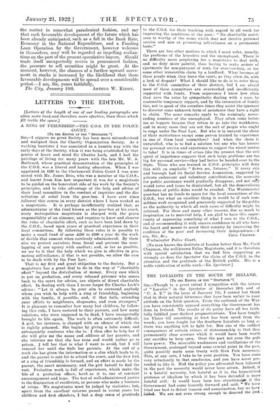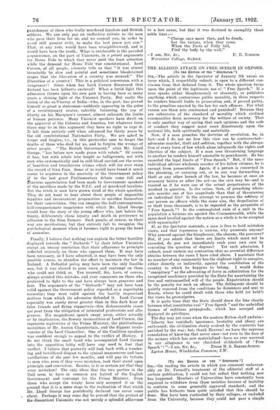THE LOYALISTS IN THE SOUTH OF IRELAND. ITo THE EDITOR
OP THE " SPECTATOR.") SIR,—Though to a great extent I sympathize with the letters of "Loyalist" in the Spectator of December 24th and of " C. A. E." in the issue of January ith, I cannot but think that in their natural bitterness they have been unfair to your attitude on the Irish question. From the outbreak of the War you have consistently opposed everything the Government has done in Ireland. The results of its policy have all too faith- fully fulfilled your darkest prognostications. You have fought for Ulster till something at least has been saved from the wreck; you have fought for the Southern Loyalists as long as there was anything left to fight for. But one of the saddest consequences of certain crimes of statesmanship is that they permanently close avenues which it would have been worth any sacrifice to keep open. Over the past not even the gods have power. The miserable weaknesses and vacillations of the Government, prolonged beyond some crucial point in the past, quite possibly made some treaty with Sinn Fein necessary. This, at any rate, I take to be your position. You have come very reluctantly to that conclusion, and you have never pre- tended to like it. Had the policy you advocated been followed in the past the necessity would never have arisen. Indeed, it is a hateful necessity, but hateful as it is, the hypocritical pretence of idealism by which it has been defended is more hateful still. It would have been less objectionable if the Government had come honestly forward and said, " We have tried our best to defeat treason and assassination, but we hav4 failed. We are not even strong enough to demand the just .
punishment of those who foully murdered loyalists and British soldiers. We can only pay an ineffective tribute to the men who gave their lives for us, and we counsel you, in order to avoid still greater evils, to make the best peace you can." That, at any rate, would have been straightforward, and it would have been the truth. What is intolerable is the paraded acquiescence, on the part of Unionists, in a priori arguments for Home Rule to which they never paid the least attention while the demand for Home Rule was constitutional. Lord Curzon, of all people, solemnly tells us that " it was almost invariably by slow and painful and sometimes bloodstained stages that the liberation of a country was secured." The liberation of a country 1 This is a political conversion with a vengeance!! Since when has Lord Curzon discovered that Ireland has been hitherto enslaved? What a lurid light this admission throws upon his own past in having been so many years a shining light of the Unionist Party. But really the vision of the ex-Viceroy of India—who, in the past, has proved himself so great a statesman—suddenly appearing in the guise of a revolutionary orator, rakishly balancing the cap of liberty on his Marquess's coronet, almost exhausts the limits of human patience. Many Unionist speakers have dwelt on the approval of the Colonies and America, but whatever force there may be in this argument they have no right to urge it. It left them entirely cold when advanced for thirty years by the old constitutional Nationalist Party. We are asked to forget and forgive, i.e., in this particular case to forget the deaths of those who died for us, and to forgive the wrongs of other people. " The British Government," cries Mr. Lloyd George, "has before now made peace with rebels." Of course it has, but with rebels who fought as belligerents, not with men who systematically and in cold blood carried out the series of heartless and treacherous crimes which will for ever stain the record of Sinn Fein. Some of us would have found it much easier to acquiesce in the necessity of the Government policy if in the last great Parliamentary debate some full and renerous appreciation had been made by Government speakers of the sacrifices made by the R.I.C. and of murdered loyalists. But the truth is men have grown tired of. the whole question. They do not want to hear about these people of impossible loyalties and inconvenient propensities to sacrifice themselves for their convictions. One can imagine the half-contemptuous, half-compassionate impatience with which Mr. Lloyd George would hear the story of the young officer who, just before the treaty, deliberately chose loyalty and death in preference to adhesion to the Sinn Feiners. Such people, of course, in their way are meritorious, but they entirely fail to recognize the psychological moment when it becomes right to grasp the hand of assassins.
Finally, I believe that nothing can explain the bitter hostility displayed towards the " Diehards " by their fellow Unionists except an uneasy conviction that their adherence to principle reflected seriously on those who opposed them. It may have been necessary, as I have admitted, it may have been the only possible course, to abandon the effort to maintain the law in Ireland. A Defeatist policy may have been the only feasible one, but it was absurd to pour scorn and contempt on those who could not think so. You yourself, Sir, have, of course, always avoided this mistake, and your comments on those who preferred to fight to the end have always been generous and fair. The arguments of the " Diehards " may not have been valid against the Government policy regarded as a regrettable necessity; they were valid against the hastily improvised motives from which its advocates defended it. Lord Carson especially was surely never greater than in this dark hour of false friends and flying supporters—this dishonourable :alive qui peut from the obligation of reiterated professions and alle- giances. His magnificent speech swept away, either actually or by implication, the flowery insincerities of Lord Curzon, the ingenious sophistries of the Prime Minister, the platitudinous moralities of Mr. Austen Chamberlain, and the flippant irrele- vancies of the Lord Chancellor. One of the Coalition speakers was confident enough to appeal to the verdict of History. I do not think the small band who accompanied Lord Carson into the opposition lobby will have any need to fear that verdict. I believe that posterity will look back with a wonder- ing and bewildered disgust to the cynical manoeuvres and base vacillations of the past few months, and will pay its tribute to men who, even if they were mistaken, took their stand upon principle and.conviction. Besides, is it so certain yet that they were mistaken? The only ideas that the two parties in the Dail seem to have in common are hatred of the English Government and contempt for the Prime Minister. Even those who accept the treaty have only accepted it on the ground that it is a mere stage to the realization of that which Mr. Lloyd ,George has pontifically declared can never come about. Perhaps it may some day be proved that the, protest of the dissentient Unionists was not merely a splendid adherence
to a lost cause, but that it was destined to exemplify those noble lines :- "Charge once more then, and be dumb, Let the victors, when they come, When the Forts of Folly fall,
Find thy body by the wall."
Worcester College, Oxford.



































 Previous page
Previous page